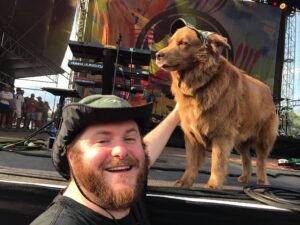The concert industry has been pushing harder in recent years to be a more inclusive space in numerous ways. Whether that means giving a wider platform to people of color and LGBTQ+ artists, or working to make the dance floor a safer space for women, many organizations have sprung forward to make and advocate for positive changes.
Though progress has been made, plenty is left to be done. One area that poses unique challenges in these Inclusivity Efforts is with regards to disabled concert-goers. Being in compliance with the Americans with Disabilities Act [ADA] is one thing, but to truly strive to make your event accessible presents unique logistical hurdles that aren’t easily addressed.
I’ve had four feet of titanium graphed to my spine since I was 18 years old. In 2017, I fractured two vertebrae while serving the Boston area as an EMT and in the years since the latter incident, my ability to ambulate on any given day is variable and chronic pain has become a part of my everyday life. Not only does this present the same challenges that face any other live music enthusiast in similar circumstances, but as a freelance music reporter, I face particular challenges unique to my situation.
I don’t work for any venue, so to the best of my knowledge they don’t owe me any particular protections as an employer, and as far as the rights of disabled patrons, I don’t even know if I fall into that category due to the fact that I’m usually working and don’t pay for a ticket. However, when I am on the job, I’m a ticket holder having an experience more akin to a customer than the working crew. So what accommodations am I owed? I’m still trying to find that out.
Most concert venues and festivals I’ve worked with in recent years have been happy to do what they can to accommodate my mobility issues. Festivals are the hardest gig to work because it requires jumping from stage to stage over the course of a weekend with who knows how many pounds of photo gear strapped to my body. I’ve attended festivals that let me park closer to a special entrance so I could limit how much walking I do in a given day. Boston Calling set the gold standard this past May by offering wheelchair-capable golf cart rides from stage to stage for every ADA ticketholder. Other events have treated me like an inconvenience at best or at worst, like some kind of smarmy rookie looking to scam his way into additional access he shouldn’t have. There have even been circumstances where a venue’s unwillingness to accommodate my ambulatory challenges has left me forced to choose between breaking the rules or injuring myself.
I’ve been at this for over fifteen years and until recently, had never found myself in a position where I had to make that kind of decision. But as my condition has worsened, it has become a very real problem. To be explicitly clear, I do not condone violating a venue or artist photo policy. That this was something I even had to consider in the first place is deeply humiliating and for a brief moment had me considering retirement as the only guarantee I wouldn’t be in this predicament again. It’s been a wakeup call that if I’m going to continue doing the work I love, I’m going to have to find new ways of doing it. That’s where Accessible Festivals comes in.
I’m sure there is more I can be doing to advocate for myself in these circumstances and that’s something I look forward to learning about. There are plenty of folks without the ability to advocate for themselves like I can, and my hope is that in time, by working with Accessible Festivals, I’ll be able to use my platform to implement the kind of changes that are necessary to make the live music experience as inclusive as possible for everyone in attendance.
Andrew Bruss is a Boston-area music educator and journalist who proudly served the Commonwealth of Massachusetts as an Emergency Medical Technician. Since 2006 he has had hundreds of articles published in numerous print and digital publications as well as experience interviewing artists on-air during his time at 88.9fm WERS. He currently lives in Boston with his wife, Jackie, where he continues to teach children by day and report on the live music industry by night.

Andrew is pictured smiling in front of a concert stage. He has a medium-length beard and is wearing a green hat. A long-haired golden dog is standing next to him and on the stage.


